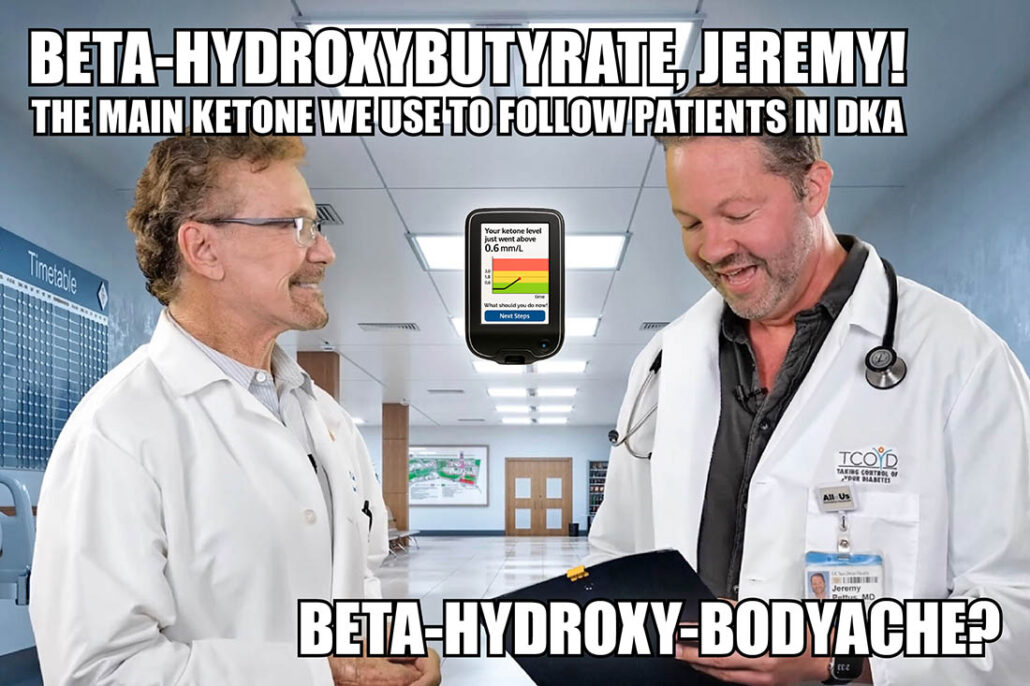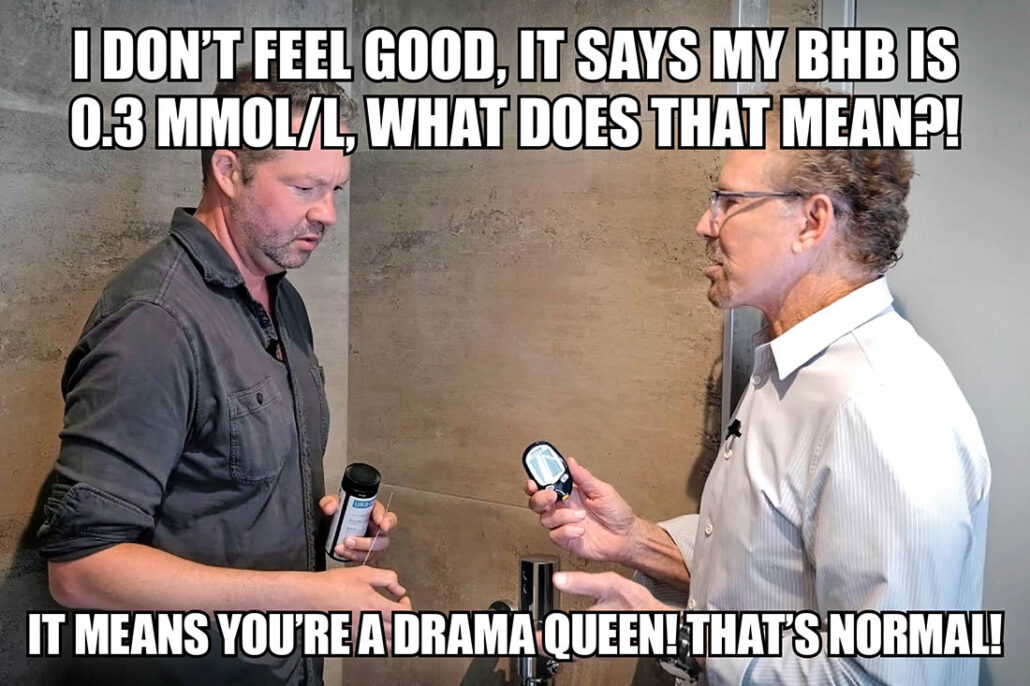Continuous Ketone Monitoring (CKM) for Patients with Diabetes: What Practitioners Need to Know About This New Technology
Earn Free CME Credit – 1.0 CEUs | 1 Hour Session
This CME will answer the important questions around CKM including:
- What type of patients are at high risk of DKA?
- What are BHB levels, and when should you be concerned and rising BHB?
- What could a CKM look like, and what features do we anticipate?
- What are the clinical implications of this new device?
- and more!
*To receive credit you must complete/pass the post-test and submit a program evaluation. Your certificate will auto-generate for download.*
This CME will answer the important questions around CKM including:
- What type of patients are at high risk of DKA?
- What are BHB levels, and when should you be concerned and rising BHB?
- What could a CKM look like, and what features do we anticipate?
- What are the clinical implications of this new device?
- and more!
*To receive credit you must complete/pass the post-test and submit a program evaluation. Your certificate will auto-generate for download.*
A First-of-Its-Kind CME Program That is Funny and Educational, Brought to You by TCOYD
Diabetic ketoacidosis (DKA) is one of the most common and dangerous reasons people with diabetes end up in the hospital. For diabetes experts Dr. Edelman and Dr. Pettus—both endocrinologists living with type 1 diabetes who have personally been admitted into the hospital in DKA—this topic hits close to home.
Their experiences fuel their belief that Continuous Ketone Monitoring (CKM) has the potential to change the way we care for people at risk of DKA, which is just about everyone who requires insulin. By catching problems earlier, CKM provides a new DKA prevention strategy that can help prevent ER visits and hospital stays, and once approved, it will also pave the way for important new research.
This free CME activity was built for the entire diabetes care team and, in true TCOYD fashion, delivers practical education with humor and energy to make learning memorable. This program will equip you with the tools and confidence to help your patients use this emerging technology to stay healthy and out of the hospital.


A First-of-Its-Kind CME Program That is Funny and Educational, Brought to You by TCOYD
Diabetic ketoacidosis (DKA) is one of the most common and dangerous reasons people with diabetes end up in the hospital. For diabetes experts Dr. Edelman and Dr. Pettus—both endocrinologists living with type 1 diabetes who have personally been admitted into the hospital in DKA—this topic hits close to home.
Their experiences fuel their belief that Continuous Ketone Monitoring (CKM) has the potential to change the way we care for people at risk of DKA, which is just about everyone who requires insulin. By catching problems earlier, CKM provides a new DKA prevention strategy that can help prevent ER visits and hospital stays, and once approved, it will also pave the way for important new research.
This free CME activity was built for the entire diabetes care team and, in true TCOYD fashion, delivers practical education with humor and energy to make learning memorable. This program will equip you with the tools and confidence to help your patients use this emerging technology to stay healthy and out of the hospital.




in-depth continuous ketone monitoring Program topics
The DKA Crisis in Diabetes: Understanding Risks, Explaining the DKA Criteria, and the Need for Better Monitoring
Explore the high prevalence and severe risks of Diabetic Ketoacidosis (DKA), particularly in Type 1 Diabetes (T1D). This topic covers DKA pathophysiology, common risk factors, and the signs and symptoms of DKA. We’ll critically examine limitations of current urine and blood ketone (BHB) testing, establishing the urgent clinical need for advanced real-time solutions like Continuous Ketone Monitoring (CKM) to enhance patient safety in diabetes care.
Continuous Ketone Monitoring (CKM): Technology Fundamentals and Clinical Advantages
Understand Continuous Ketone Monitoring (CKM) as a key advancement in diabetes technology. Learn how CKM continuously measures Beta-Hydroxybutyrate (BHB) levels, providing real-time ketone data and actionable alerts. This free CME session highlights CKM’s benefits over traditional methods, including earlier ketosis detection, proactive DKA prevention, and an overview of the emerging CKM device landscape.
Actionable CKM Data: Interpretation for DKA Prevention and Treatment Protocols
Master the practical application of CKM for improved clinical decision-making. This crucial module provides a systematic guide to interpreting continuous ketone data, understanding BHB level thresholds, and responding effectively to CKM alerts. Learn evidence-based DKA prevention strategies and treatment algorithms for CKM users, including insulin adjustments and sick day management to prevent DKA.
CKM Integration: Enhancing Clinical Workflow and Patient Empowerment
Discover strategies to integrate Continuous Ketone Monitoring (CKM) into your clinical workflow, including managing CKM patient data, urgent ketone alerts, and leveraging CKM for remote patient monitoring. Emphasis is placed on effective patient education, including teaching individuals to use their CKM device, interpret ketone data, and respond to alerts for improved diabetes self-management and how to treat DKA.
Future of CKM: Driving Adoption, Innovation, and Improved Diabetes Outcomes
Examine the evolving landscape and future of Continuous Ketone Monitoring (CKM) technology, including its potential integration with Automated Insulin Delivery (AID) systems. Discuss strategies to accelerate CKM acceptance, drawing lessons from CGM adoption, and address barriers like clinician training to ensure successful CKM implementation for superior DKA prevention and diabetes management.

PROGRAM OVERVIEW
- Overview and introduction to Continuous Ketone Monitoring (CKM)
- How to educate patients about the signs and symptoms of DKA
- Benefits of CKM devices to prevent or reverse DKA

LEARNING OBJECTIVES
- Describe the current prevalence and clinical impact of diabetic ketoacidosis (DKA) in individuals with diabetes.
- Identify key risk factors, early warning signs, and symptoms associated with DKA.
- Evaluate the effectiveness and limitations of current DKA detection methods.
- Explain the clinical benefits and functionality of CKM (Continuous Ketone Monitoring) devices.
- Demonstrate strategies for patient education and integration of CKM technology into clinical practice.

WHO CAN BENEFIT MOST
This free CME credit course is designed for diabetes healthcare providers, including endocrinologists, primary care physicians, nurse practitioners, physician assistants, nurses, certified diabetes educators, pharmacists, and other healthcare providers wanting to expand their knowledge of diabetes management using CKM technology.
SPEAKERS & FACULTY
*extra-relatable faculty (they're living with type 1)

Dr. Edelman is a professor of medicine in the Division of Endocrinology, Diabetes & Metabolism at the University of California, San Diego (UCSD) and the Veterans Affairs (VA) Healthcare System of San Diego. Dr. Edelman, who has type 1 diabetes himself, has written more than 200 articles, five books, and has won numerous awards for teaching and humanitarianism. He has been chosen by the medical students at UCSD as the ‘teacher of the year’ numerous times. Among his many honors, Dr. Edelman has received the ‘Diabetes Educator Of The Year’ award by the American Diabetes Association, the ‘Distinction in Endocrinology’ award by the American Association of Clinical Endocrinologists, and named ‘Top 1% of U.S. Endocrinologists’ by US News and World Report.

Dr. Jeremy Pettus was diagnosed with type 1 diabetes when he was 15 years old. Since that time he has dedicated his career to educating and treating others like himself. He is currently an Endocrinologist and Assistant Professor of Medicine at the University of California, San Diego. There, he focuses primarily on clinical trials to develop and test new and innovative therapies for people living with diabetes. These include studies ranging from medications to reverse or slow the disease once it occurs, to islet cell transplantation strategies, to device studies such as artificial pancreas technology. As somebody who has the disease himself, sees patients with type 1, and is actively working on curing/treating the disease, we are honored to have him at TCOYD.
What past participants say about this CME Program
I absolutely love this activity. They know how to give information in a funny way and yet, very informative!
As always, I enjoyed the webinar while learning. My mind didn’t drift as it usually does!
Excellent presenters! Love their use of video humor to keep us engaged in the learning process!
Love this approach to CME!! So fun and light!
Fun and entertaining– it’ll help the info stick. Thanks
Excellent presenters! Love their use of video humor to keep us engaged in the learning process!
frequently asked questions
This free, 1-hour enduring activity offers 1.0 credit across multiple boards, including for physicians, nurses, pharmacists, and pharmacy technicians. Wondering if the credit will satisfy your board requirements? Just contact us and ask. Remember, the activity window for this free CME is from August 1, 2025 – August 1, 2026.
Click “Click to Claim Credit” on the course page, view the full 60-minute program, then pass the post-test and submit the evaluation. Your certificate auto-generates for download immediately after the evaluation. You can also download the slide deck directly from the page. For support, use our contact page.
Absolutely. This CME is for the whole diabetes care team. It’s designed for primary care clinicians, NPs, PAs, nurses, CDCESs, pharmacists, and others who manage people at risk for DKA. The curriculum covers DKA criteria, interpreting BHB/ketone data, CKM alert response, sick-day and treatment algorithms, and workflow integration, so non-endocrine providers can put CKM into practice immediately.
Successful Completion
To receive a Statement of Credit you must view the entire 60 min enduring activity. Your Statement of Credit will be issued electronically immediately upon submission of the evaluation form to the email address provided. Contact Olivia Montanari at olivia@tcoyd.org with questions.
Program Fees and Registration
This is a complimentary (free) CME program. Registration is not required to view the materials, however, to obtain credit learners will be required to submit necessary identifying information, complete a post-test, and evaluation.
Acknowledgement of Joint Providership
This activity is jointly provided by The Association of Diabetes Care & Education Specialists (ADCES) and TCOYD. The Association of Diabetes Care & Education Specialists is jointly accredited by the Accreditation Council for Continuing Medical Education (ACCME), the Accreditation Council for Pharmacy Education (ACPE), and the American Nurses Credentialing Center (ANCC) to provide continuing education for the healthcare team. ADCES’ Joint Accreditation Status also includes the Commission on Dietetic Registration (CDR) and American Academy of Physician Assistants (AAPA). ADCES will provide accreditation for this activity to ensure the content is scientifically based, accurate, current, and objective. Any conflicts among faculty or others involved in the planning and execution of this activity will be resolved.
This activity is provided as enduring material via tcoyd.org and will be available from 8/1/25 to 8/1/26.
Acknowledgement of Financial Support
This free CME activity is supported by an educational grant from Abbott Diabetes Care
ACCREDITATION INFORMATION
This program is jointly provided with the Association of Diabetes Care & Education Specialists.
 In support of improving patient care, this activity has been planned by Taking Control Of Your Diabetes and the Association of Diabetes Care & Education Specialists. Association of Diabetes Care & Education Specialists is jointly accredited by the Accreditation Council for Continuing Medical Education (ACCME), the Accreditation Council for Pharmacy Education (ACPE), and the American Nurses Credentialing Center (ANCC) to provide continuing education for the healthcare team.
In support of improving patient care, this activity has been planned by Taking Control Of Your Diabetes and the Association of Diabetes Care & Education Specialists. Association of Diabetes Care & Education Specialists is jointly accredited by the Accreditation Council for Continuing Medical Education (ACCME), the Accreditation Council for Pharmacy Education (ACPE), and the American Nurses Credentialing Center (ANCC) to provide continuing education for the healthcare team.
Accreditation Council for Pharmacy Education
The Universal Activity Number is UAN JA4008258-9999-25-256-H01-P, UAN JA4008258-9999-25-256-H01-T. This Knowledge-based activity has been approved for 1.0 contact hour(s). This statement contains information provided to NABP from the Accreditation Council for Pharmacy Education (ACPE) via CPE Monitor®. ACPE policy states paper and/or electronic statements of credit may no longer be distributed directly to learners as proof of ACPE credit. The official record of credit may be located in the learner’s e-profile in CPE Monitor.
American Medical Association (AMA)
Association of Diabetes Care & Education Specialists designates this enduring activity for a maximum of 1.0 AMA PRA Category 1 Credit(s)TM. Physicians should claim only the credit commensurate with the extent of their participation in the activity.
American Nurses Credentialing Center (ANCC)
Association of Diabetes Care & Education Specialists designates this activity for a maximum of 1.0 ANCC contact hours.
The Association of Diabetes Care & Education Specialists is approved by the California Board of Registered Nursing, Provider Number 10977, for 1.0 contact hours. RNs must retain this document for 4 years after the activity concludes.
 The Association of Diabetes Care & Education Specialists has been authorized by the American Academy of PAs (AAPA) to award AAPA Category 1 CME credit for activities planned in accordance with AAPA CME Criteria. This activity is designated for 1.0 AAPA Category 1 CME credits. PAs should only claim credit commensurate with the extent of their participation.
The Association of Diabetes Care & Education Specialists has been authorized by the American Academy of PAs (AAPA) to award AAPA Category 1 CME credit for activities planned in accordance with AAPA CME Criteria. This activity is designated for 1.0 AAPA Category 1 CME credits. PAs should only claim credit commensurate with the extent of their participation.
 Commission on Dietetic Registration (CDR): CDR Credentialed Practitioners will receive 1.0 Continuing Professional Education units (CPEUs) for completion of this activity. Completion of this RD/DTR profession-specific or IPCE activity awards CPEUs (One IPCE credit = One CPEU). If the activity is dietetics-related but not targeted to RDs or DTRs, CPEUs may be claimed which are commensurate with participation in contact hours (One 60 minute hour = 1 CPEU). RDs and DTRs are to select activity type 102 in their Activity Log.
Commission on Dietetic Registration (CDR): CDR Credentialed Practitioners will receive 1.0 Continuing Professional Education units (CPEUs) for completion of this activity. Completion of this RD/DTR profession-specific or IPCE activity awards CPEUs (One IPCE credit = One CPEU). If the activity is dietetics-related but not targeted to RDs or DTRs, CPEUs may be claimed which are commensurate with participation in contact hours (One 60 minute hour = 1 CPEU). RDs and DTRs are to select activity type 102 in their Activity Log.
Certified Diabetes Care and Education Specialists: To satisfy the requirements for renewal of certification for the Certification Board for Diabetes Care and Education (CBDCE), continuing education activities must be diabetes related and approved by a provider on the CBDCE list of Approved Providers (www.cbdce.org). CBDCE does not approve continuing education. The Association of Diabetes Care & Education Specialists is on the CBDCE list of Approved Providers.
Other Health Professionals
It is the responsibility of each participant to determine if the program meets the criteria for re-licensure or recertification for their discipline.
Speaker Disclosures
In accordance with the ACCME Standards for Integrity and Independence, the Association of Diabetes Care & Education Specialists (ADCES) requires anyone in a position to affect or control continuing education content (e.g., authors, presenters, and program planners) to disclose all financial relationships with ineligible companies. It is the responsibility of ADCES to mitigate and disclose all relevant conflicts of interest. Disclosure of a relationship is not intended to suggest or condone bias in any presentation but is made to provide participants with information that might be of potential importance to their evaluation of the presentation.
Relevant disclosures (or lack thereof) among education activity planners and faculty are as follows:
Speakers:
Steven V. Edelman, MD
Board of Directors: Senseonics, Team Type 1 501(c)(3), TCOYD 501(c)(3)
Advisor/Consultant/Speaker: Eli Lilly, NovoNordisk, Vertex Pharmaceuticals, Sanofi, Xeris Pharmaceuticals
Shareholder: Senseonics
Jeremy H. Pettus, MD
Consultant: Carmot Therapeutics, NovoNordisk, Sanofi
Speakers Bureau: MannKind Corporation, Sanofi
All relevant relationships have been mitigated.
Planners:
Olivia Montanari – No Financial Relationships to Report
Autumn Zarlengo – No Financial Relationships to Report

Hey- your post test last question is incorrect. The first option of giving a dose of basal insulin is inappropriate and should be the correct answer.
Ketone monitoring for T1D is SO important and it is very difficult to get ketone strips covered by insurance. Advocate!
Hi Julie,
Dr. Edelman checked the post test, and you are correct. Thank you for bringing it to our attention, and our apologies. It has been fixed!
Good presentation
Thanks Deb! Appreciate it!
Thank you for pointing this out…Like I said there’s way worse things I can have than diabetes especially from what I’ve learned from your conference that I went to during September 2019..
This website I also find very helpful especially since it gives me a lot of pointers…Plus when I went to your conference during September 2019 I picked up at least three (3) main key points…One (1) of them was it doesn’t matter if society judges me for having diabetes or not…Two (2) is I have diabetes but it doesn’t have me it doesn’t have to & three (3) IS diabetes is big but I’m bigger…That right there says that there’s worse things i can have than diabetes. Thank you for your time & attention
Thanks for your comment and for being part of the TCOYD community, Sonny!
Thank you for having me I really do appreciate getting to be part of your program
good
I would like more information please
What information are you looking for, specifically? Continuous ketone monitoring is not available yet, but it hopefully will be soon!
I may have type 2 diabetes..both my parents are diabetes.
If you think you may have diabetes, let your healthcare provider know. They will be able to run tests to determine if you do.
What’s the difference in cam and cam?
Sorry, not sure what you are referring to? Would you mind clarifying your question?
I would like to share this with my spouse who is a MODY since 1975.can you send me a link? Pat Baker RPh. Piggleb39@gmail.com